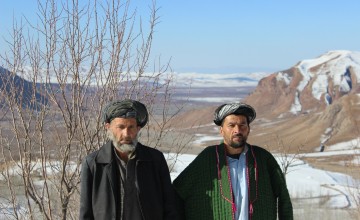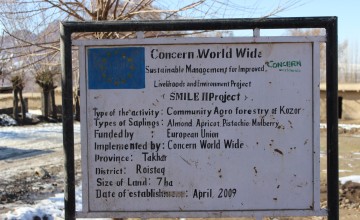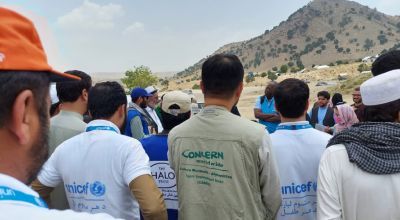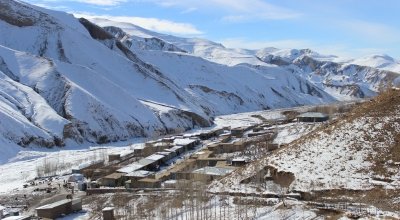
Read our 2023 annual report

Knowledge Hub
Improving livelihoods with a community forest in Afghanistan

In the third of our series of blogs from Afghanistan, a Concern staff member reports on his visit to the remote village of Kozur in the north east of the country. Here, he met 60-year-old Hakim* who worked with Concern to develop thriving a community forest filled with almond, apricot, pistachio and mulberry trees.
A hostile environment
The people of Kozur village live at the mercy of the elements. In 1998, they were among the communities in Rustaq district decimated by an earthquake which killed at least 4,500 people. On an ongoing basis, they contend with years of poor rainfall and long winters of heavy snow and flash floods. Located on a floodway, they have lost homes, land and farm animals to these floods.
The hostile physical environment and poor soil fertility had led to a cycle of poverty taking hold in Kozur. However things are now starting to change here thanks to a thriving new community forest. On my visit to the village, I met 60-year-old Hakim*, a volunteer forest keeper, who told me how a nursery of saplings and strong community cooperation are beginning to make an impact.
Hakim’s story
Hakim has not had an easy life. His wife, three sons and daughter are all dependent on his income, and he spent much of his life working as a labourer in the rice fields in the Darqad district – away from his home – receiving rice or cash as payment.

Although Hakim has his own land, in the past, his knowledge and income limited him to growing onions and potatoes only on it. He says it was very difficult to manage, as often he would have to choose between selling and eating the produce. If he sold it, his family would go hungry, but if he did not, they could not afford basic things like firewood in the winter.
In the face of this harsh existence, Hakim depicts a strong sense of community spirit in Kozur. During lean periods when he had no money, kind farmers gave him rice for free knowing he was extremely poor and had a family to support. At these times, his neighbours would also help out with cash and food. These strong values are now serving Hakim and his village well as they work with Concern to grow their own community forest.
A community effort
Developed through the European Union-funded Sustainable Management for Improved Livelihoods and Environment Project (SMILE) project, the forest includes a selection of thriving almond, apricot, pistachio and mulberry trees. However it wasn’t always so lush – in fact the rocky hillside where it sits was once deemed too infertile for anything to grow there.

To get the project started, the Concern team provided the saplings, technical guidance, alfalfa seeds and cement, and constructed check dams to protect the forest. However this is very much a community effort – Hakim and the villagers prepared the land, planted the saplings, excavated the foundation for the reservoir, provided the gravel and stone and excavated the pipeline for water. As the forest grows, they continue to irrigate the land – assisted by an extra reservoir installed by the Concern team – prune the trees and carry out disease control.
Before, even though many members of the community had land, they had no knowledge of how to best utilize it. Now, everyone who participated in the training sessions has the knowledge of how to grow quality produce to consume or to sell. And no individual person profits from this forest – all of the money goes straight back into the community to build water systems and pumps. At harvest time, the whole community gets together and participates.

From onions to fruit trees
When the forestry project came to Kozur, Hakim volunteered to be trained as a forest keeper and develop a demonstration plot. He went on training trips and learned how to graft, prune, transfer saplings and control pests. He transformed his onion and potato plots into a nursery of fruit tree saplings which he can sell at the market for 10 Afghan Afghanis each (approximately 15 cent).
With the money Hakim has made, he is able to build a house, provide for all his children’s school needs, take his family to the doctor and buy medicine when necessary. He is also giving back to the community by providing cuttings to his neighbours and donating saplings to schools, mosques and his family and friends. Additionally, he is passing on his knowledge by training others in the community in composting.
Hakim concludes:
Life is much better now. Concern helped build my capacity and I can earn a regular income now. If Concern trains others, they can also be like me."
Concern's SMILE project in Kozur has already reached 1,800 people directly and 4,500 indirectly.
* Names changed for security purposes.




